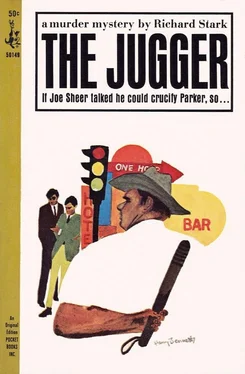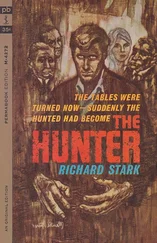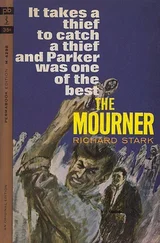“I asked you if you ever did any vaudeville.”
“What did you call me, you son of a bitch? What name did you say?”
Younger laughed and said, “Oh, come on, Joe, we’re pals, you don’t have to put on the act for me. I’ve known your name from the beginning.”
The old man shook his head. He acted dazed now. He pushed away from the car, turned and started back for the house, walking as though he were drunk.
Younger let him get halfway to the stoop and then called, “Sheer!” He put steel in his voice now, let all the familiarity and jollity drain out of it. “Come back here!” he shouted, and it was the way a first sergeant shouts it.
Now was the moment of decision. At this point, the old man had to make up his mind for good and all; he couldn’t wait and hope and let things ride any longer. He could choose to try a hopeless bluff, or he could choose to go into the house and lock the doors and break out whatever artillery he had in there for a last-ditch stand, or he could give in completely and come back and turn himself over to Younger for whatever Younger wanted with him.
Nearly a minute went by while the old man stood in front of his house, back to Younger, unmoving, making up his mind. When he finally made his decision, it was the only one he could have made, really, considering everything. He was too smart to try a hopeless bluff, and too old to try a last-ditch stand. He turned around and came back to Younger.
Younger said, “Get in the car.” The steel was in his voice to stay; he was in command now, the free ride was over.
The old man got into the car, and sat there wordlessly.
Younger handed him the clipboard and a pen. “In chronological order,” he said, “I want you to write down every robbery you were ever in, what year it happened, and how much you got out of it. Not the whole take, just your cut.”
Hopeless, the old man whispered, “What do you want from me?”
“I just told you. Now listen close. Do it in three columns, date first and then what city it was and then how much you got. You don’t have to worry about the month or anything, just the year.”
The old man looked at the pen in his hand and the clipboard on his lap with the blank sheet of paper ready on it. With the same hopelessness in his voice, he said, “I’m not sure I can remember everything.”
“You’ll remember.”
It took nearly half an hour. Younger smoked a cigar and listened to the occasional calls on the radio and watched the little traffic on the street; he felt no impatience. Everything would come, everything in its time. He’d waited fifty-one years, he could wait a little longer.
Finally, the old man said, “There. That’s it.”
Younger took the list and studied it, and saw nothing listed for Cleveland in 1953. He shook his head and put the list down and smashed the old man backhanded across the face. “Don’t lie to me,” he said. “Don’t ever lie to me again, Sheer.” He ripped the top sheet off and handed the clipboard back. “This time,” he said, “do it right.”
The old man wordlessly started writing again. When he was done this time, there was an entry for Cleveland in 1953. Younger nodded and said, “All right, Sheer, that’s good. You can go on now.”
The old man looked at him in surprise. “I can what?”
“Get out of the car. Go home.”
“For God’s sake, Captain Younger, what do you want from me?”
“I’ll be back,” Younger promised him. “And you’ll be here. If you know what’s good for you.”
“One million, eight hundred and seventy-six thousand dollars.” Younger said it slowly, in rich, round tones, enjoying the sensual feeling of the numbers in his mouth. “You made an awful lot of money, Joe,” he said. “An awful lot of money.”
They were sitting in the old man’s living room, three days after the list had been made up. The old man seemed thinner than before, and more lined, and more hopeless. He was getting ripe, slowly getting ripe, but Younger was in no hurry. When he made the final move, he was going to know the old man was ready.
Besides, anticipating was half the pleasure. There was no need to hurry the chase to its conclusion.
“Tell me about it, Joe,” he said. He was being affable again today, letting a little slack in the line, not wanting the old man to get so desperate he’d do something stupid, like leave everything behind and run away. He said, “Tell me how these robberies are done. Tell me about, say, the Cleveland robbery, the one in ’53.”
The old man looked at him. “Why?”
Younger shrugged and smiled and said, “I’m interested, that’s all. You’re the first man in your job I’ve ever met. Tell me the whole thing, Joe. First the Cleveland job in ’53, and then the Des Moines robbery in ’49, and then... well, just start.”
The old man said, “I don’t understand you. I can’t figure you out.”
“Don’t even try, Joe. Just tell me the story of your life.”
The old man started, talking hesitantly at first, with long pauses, trying to find the words and trying to understand why he was supposed to talk now. But gradually the tempo speeded up as the old man got into the story, and all the details began to flow: how a robbery was set up, what each man did, what was done in this particular job and that particular job, what went wrong here and what went right there.
From time to time he mentioned a name, and each time, Younger quietly wrote the name down, just to have.
The old man talked, and Younger listened, and slowly the old man was relaxing, was getting interested in the process of telling his stories, treating them like anecdotes, like conversation. Younger was interested, too, enjoying listening as he had earlier on the train enjoyed telling his own anecdotes.
Afternoon lengthened, and the room turned semidark, and the old man’s voice droned on. Younger smiled and nodded and listened, making his interest obvious. In some strange way it was a good afternoon, one of the best either of them had ever lived.
When it was over, the old man said, “I don’t understand you. You’re a policeman, you know all this about me, but you don’t arrest me. You push me and push me, but then you don’t do anything about it. I just can’t figure you out, I can’t figure out what you want.”
Younger, at the door, turned and smiled. “What I want? That’s easy. Half. See you soon.” He put on his cowboy hat and left.
“But I don’t have that much!”
“Sure you do, Joe.” Younger was being patient, as patient as a saint. “I showed you the figures, and that’s the way it’s got to be.”
The old man sat there on the sofa, wringing his hands. “You know where all my money is,” he said. “It’s in banks and mutual funds; it’s all invested. I wouldn’t have money around in cash like that. Why would I do something as stupid as that?”
“Half a million, Joe,” Younger said, enjoying the phrase, liking to say it. “Half a million at least, at the very least. And I want half of it. And my patience is wearing thin, Joe.”
“I swear to God, I swear I don’t have that much, I don’t have anywhere near that much. I swear to God.”
Younger sighed and shook his head. “Every one of these sessions I have to wind up slapping you around. I hate to do that, Joe, honest I do. Now let’s quit fooling around, for good and all.”
“Wait! Wait, please!”
Younger stood over him, hands bunched.
The old man said, “I’ll give you what I can, what I have... I have a thousand dollars in the house, I’ll give you that. And I’ll get the rest of it, everything I have.”
“A thousand? Let’s see it.”
Читать дальше












